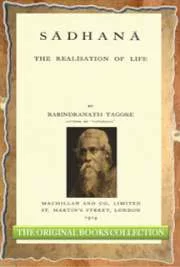
Understanding the wisdom of Rabindranath Tagore’s Sādhanā: The Realisation of Life.
BY FAISAL HOQUE
“I have had my invitation to the world’s festival, and thus my life has been blessed. My eyes have seen and my ears have heard.
It was my part at this feast to play upon my instrument, and I have done all I could.”
– Gitanjali, Nobel Laureate Rabindranath Tagore
If I had to name only one non-fictional book that has had the most profound impact on me, it would have to be Sādhanā: The Realisation of Life by Nobel Laureate Rabindranath Tagore.

Rabindranath Thakur, Anglicized to Tagore (Bengali: রবীন্দ্রনাথ ঠাকুর) (1861 – 1941), was a Bengali “renaissance man” who reshaped his region’s literature and music. He became the first non-European to win the Nobel Prize in Literature in 1913.
Being a Bengali myself, my love affair with Tagore began in my teens. And as I have grown older, Sadhana is one book that I go back to repeatedly. It is one of those rare books that needs to be read slowly, as each sentence contains an immense amount of wisdom.
Compiled and translated by Tagore from his Bengali lectures, the book consists of eight essays, in which Tagore answers some of the most profound questions of life: Why did God create this world? Why would a Perfect Being, instead of remaining eternally concentrated in Himself, go through the trouble of manifesting the Universe? Why does evil exist? Do love and beauty have a purpose?
Tagore masterfully brings the spiritual truths behind these profound questions to light, with his lucid explanations of the Sanskrit verses of the Upanishads (Indian spiritual texts dating to ~800 B.C.) and the eternal teachings of Jesus and Buddha.
Recently, I was asked to give some insight from Sadhana. I thought I’d share three of my favorite passages from the first couple of chapters here:
OUR JOURNEY
“We can look upon a road from two different points of view. One regards it as dividing us from the object of our desire. In that case, we count every step of our journey over it as something obtained by force in the face of obstruction. The other sees it as the road which leads us to our destination, and as such, it is part of our goal. It is already the beginning of our attainment, and by journeying over it, we can only gain that which within itself it offers to us.”–Page 7
OUR BARRIERS
“The civilisation of ancient Greece was nurtured within city walls. In fact, all the modern civilisations have their cradles of brick and mortar. These walls leave their mark deep in the minds of men. They set up a principle of “divide and rule” in our mental outlook, which begets in us a habit of securing all our conquests by fortifying them and separating them from one another. We divide nation and nation, knowledge and knowledge, man and nature. It breeds in us a strong suspicion of whatever is beyond the barriers we have built, and everything has to fight hard for its entrance into our recognition.”–Page 6
GAIN BY GIVING AWAY
“The man who aims at his own aggrandizement underrates everything else. Compared to his ego the rest of the world is unreal. Thus in order to be fully conscious of the reality of all, one has to be free himself from the bonds of personal desires. This discipline we have to go through to prepare ourselves for our social duties–for sharing the burdens of our fellow-beings. Every endeavor to attain a larger life requires of man “to gain by giving away, and not to be greedy.” And thus to expand gradually the consciousness of one’s unity with all is the striving of humanity.”–Page 15
To lead an impactful life, it takes fearless passion, courage, and relentless mental disciplines that come from deep insights into our own soul. It is about finding satisfaction, contentment, and fulfillment in our unique journey. It is living with a purpose and making an impact to the best of our abilities. Sadhana reminds me of these profound lessons each time I pick it up.
Read the full article @FastCompany.













